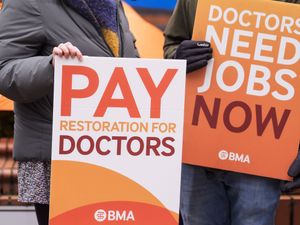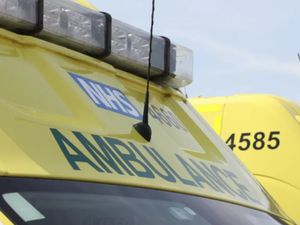110 more coronavirus deaths confirmed in Black Country, Birmingham and Staffordshire
A total of 110 more people have been confirmed to have died with coronavirus across the Black Country, Birmingham and Staffordshire.
It means 1,140 people have now died in the region's hospitals after testing positive for coronavirus, while the UK-wide death toll today increased by 717 to 11,329.
In England 667 more people were announced to have died after contracting the virus on Monday, bringing the total to 10,261.
Patients were aged between 17 and 101 years old. Forty of the 667 patients – aged between 37 and 98 years old – had no known underlying health conditions.
More Covid-19 coverage:
At Walsall Healthcare Trust, 23 more people were confirmed to have died, taking the total to 96.
At Dudley Group NHS Foundation Trust 16 more deaths were announced, bringing the total to 144, and at Sandwell and West Birmingham NHS Trust – which runs Sandwell and City Hospitals – the death toll increased by 14 to 194.
Eleven more deaths were confirmed at Royal Wolverhampton NHS Trust, meaning a total of 162.
And nine more deaths were announced at University Hospitals of North Midlands Trust, which runs Stafford County and Royal Stoke Hospitals – meaning the total who have died there is 91.
At University Hospitals Birmingham 35 more people were confirmed to have died, making a total of 439.
One more person has also died at Birmingham Community Healthcare, which in total has seen 11 dead.
The first person has also been reported to have died at North Staffordshire Combined Healthcare NHS Trust, which runs mental health services across Stoke-on-Trent.
No more deaths were reported at Royal Orthopaedic Hospital Birmingham, which has had two so far.
The figures released each day refer to the number of coronavirus-related deaths confirmed in the previous 24 hours - not the number of people who died in the last 24 hours - and always include patients who died some time earlier but who were yet to be added to statistics due to testing or informing relatives.
The true death toll is likely to be far higher as the NHS figures only include patients who died in hospital and not, for example, people who died in care homes.
'Plan is working'
The figures were released as the Government insisted its plan to tackle the coronavirus pandemic “is working” but warned the nationwide lockdown will not be lifted this week.
Foreign Secretary Dominic Raab showed some cautious optimism as he revealed the latest data suggested the UK was “starting to win this struggle”, three weeks after restrictions were imposed.as he revealed the latest data suggested the UK was “starting to win this struggle”, three weeks after restrictions were imposed.
But he insisted the virus was not yet past its peak and that it was “far too early” to talk about relaxing the measures, with reports suggesting the lockdown will be extended for at least another three weeks.
Speaking at Monday’s Downing Street press conference, he praised the public for staying at home over the Easter weekend, and added: “Our plan is working.
“Please stick with it, and we’ll get through this crisis together.”
Details of how the lockdown will eventually be lifted remain unclear, however, with the Government repeatedly refusing to outline its “exit strategy”.
Scientists advising the Government are expected to meet this week to review the latest figures, but Mr Raab insisted it was crucial that “we do not take our eye off the ball” with regards to social distancing.
The Government also continues to face pressure over shortages of personal protective equipment (PPE) for frontline NHS staff, as a growing number of health workers died.
According to The Guardian, the UK missed three chances to be part of an EU scheme to bulk buy personal protective equipment for health workers, with European medical staff set to receive the first of £1.3 billion-worth of PPE within days or a maximum of two weeks under the scheme.
Mr Raab is leading the Government as Boris Johnson continues his recovery from the virus at Chequers.
It came as the World Health Organisation said restrictions should be lifted slowly and not “all at once” to avoid a resurgence of the virus, and only if appropriate measures are in place, including “significant” capacity for contact tracing.




